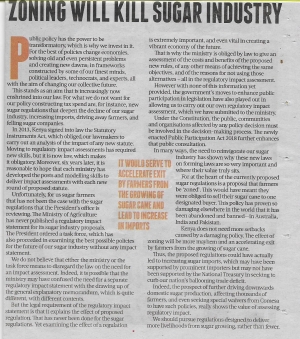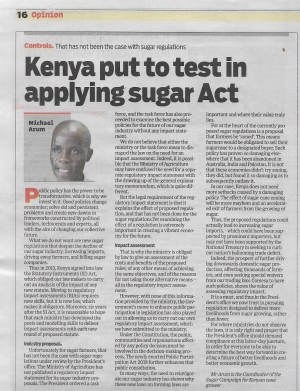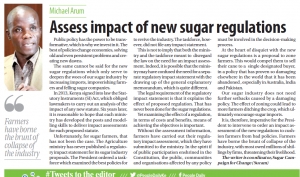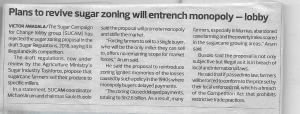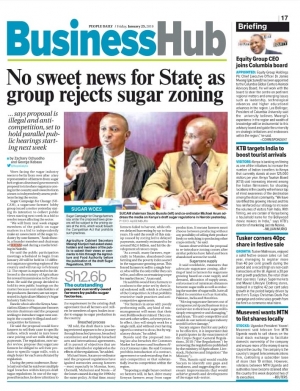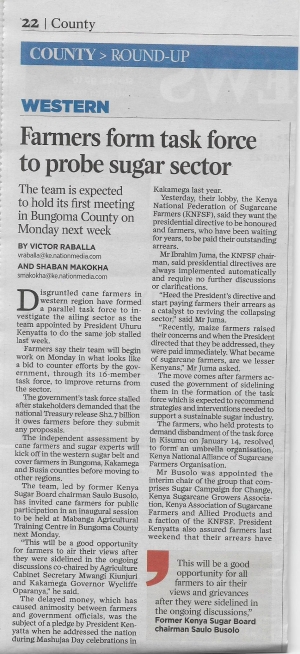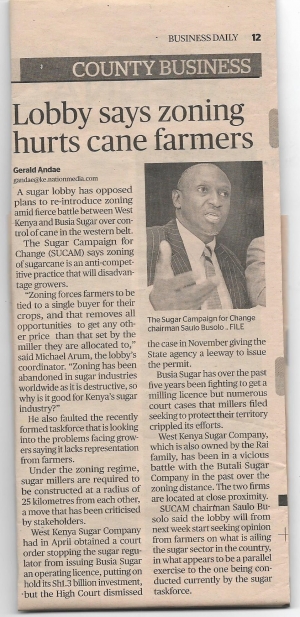Newsroom
Super User
Zoning will kill sugar industry
Kenya put to test in applying sugar act
Assess impact of new regulations
Plans to revive sugar zoning will entrench monopoly-lobby
No sweet news for state as group rejects sugar zoning
Farmers form task force to probe sugar sector
Lobby says zoning hurts cane farmers
Sugar farmers attack draft industry regulations as anti-constitutional and illegal on multiple counts
SUCAM, the sugar campaign for change advocacy group, today laid out multiple legal breaches within Kenya’s draft sugar regulations in an alert to the Ministry of Agriculture’s Sugar Industry Task Force of the need to be vigilant in observing Kenya’s constitution, trade agreements, and existing legal framework.
In one of multiple legal breaches, SUCAM drew attention to the requirement in the existing draft agreement that all farmers and millers be members of apex bodies in order to engage in sugar production.
“This requirement flies in the face of the “freedom to be members” of associations as spelt out in section 14 of the Crops Act as well as Article 36 (2) of the Constitution, which guarantees the right that “a person shall not be compelled to join an association of any kind”,” said Hon. Saulo Busolo SUCAM Chairman.
“To be clear, it is within the boundaries of the law to recommend that farmers join an association, but it is literally beyond the authority of the Ministry of Agriculture to dictate compulsory membership of any association,” said Saulo Busolo SUCAM Chairman.
“Yet these draft regulations encompass multiple such adventures into extended authority, anti-competition, and legislative breach.”
Under the Statutory Instruments Act, 2013, all regulation must be accompanied by a Regulatory Impact Statement that includes an explanation of the effect of the proposed legislation. Yet the draft sugar regulations, having used an alternative template instead of the legal template for an impact statement, failed to explain the effect of the regulations.
“Considering the deleterious effect that many of the proposed regulations are set to have, it may be no coincidence that the regulations further breach the statutory process in failing to lay out the effect of the rules,” said Saulo.
“But if the legislators are unable to explain the effects of the regulations, how did they determine that these were desirable rules to have? What were the criteria? We simply have no sight of what these regulations were designed to achieve.”
The Statutory Instruments Act, 2013 was also breached through the omission of any cost benefit analysis from the regulations and in the failure to examine any alternative means for securing the same (unstated) outcomes.
“All told, the draft that is now being reviewed appears to be a journey through breached process, breached constitution, and multiple breached acts and international agreements, all in pursuit of objectives that are neither identified or explained as the effects of the regulations,” said Saulo.
“This makes it imperative for the taskforce now reviewing these proposals to be vigilant in observing Kenyan and international law and in ensuring that their own recommendations comply with the aims and outcomes of the nation’s body of preceding legislation.”
Farmers declare sugar zoning illegal unless given waiver by competition authority
SUCAM, the sugar campaign for change advocacy group, today declared that the sugar zoning proposed in Kenya's draft Sugar Regulations, 2018 is an illegal and anti-competitive constraint that would require an express waiver by the Competition Authority.
The draft regulations, now under review by the Agriculture Ministry's Sugar Industry Taskforce, propose that sugar cane farmers be obliged to sell their produce to specific sugar mills, with a single buyer for each area dictated by regulation.
The proposed reintroduction of zoning has ignited memories among farmers - most especially in Mumias, SONY, Chemelil, Muhuroni and Nzoia - of the losses caused during the 1990s by the same policy. At that time, many farmers failed to harvest, while others delayed harvesting by up to four years. The zoning caused delayed payments, currently totaling to Sh2.6bn, and hit the development of ratoon crops. As a result, many farmers, especially in Mumias, abandoned cane farming and the poverty index soared in the sugarcane growing areas.
"Forcing farmers to sell to a single buyer, who will be the only miller they can sell to, offers no remaining scope for market forces," said Michael Arum, SUCAM Coordinator.
Farmers will be forced to conform to the price set by their local enforced mill, which is a breach of the Competition Act that prohibits restrictive trade practices and anti-competitive agreements.
"For farmers in areas with poorly performing mills, any mill mismanagement will mean that their own livelihoods are ruined. They cannot seek other sellers, or better prices. In effect, they will simply work for a single mill, and without ever having signed a contract to do so, but by regulatory dictate."
The zoning law also is a breach of COMESA rules that prohibit the introduction of a contract, agreement or understanding that is anti-competitive or substantially lessens competition within the common market, said SUCAM.
"Imposing a single buyer contract on farmers will, in fact, drive many Kenyan farmers away from sugar production. It means farmers must produce without any possibility of selling their produce freely, versus switching to producing other crops entirely," said Hon Saulo Busolo SUCAM Chairman.
The proposed regulation also breaches the WTO Agreement on Agriculture, which encourages the use of domestic support policies to maintain the rural economy and increase market access and which do not distort trade or pricing.
The proposal that Kenya's sugar industry introduces zoning comes after similar policies have failed and been abandoned all over the world.
Worldwide, measures that span sugarcane zoning; the allotting of land to farmers for sugar growing based on sugarcane supply and demand; the allocation of supply areas; the enforcement of minimum distances between sugar mills; as well as reducing the number of sugar mills, have all failed in countries that include Australia, Pakistan, India and Mauritius.
"Moving sugar farmers out of entrepreneurship and business into a tied service to their local sugar mill is simply retrogressive and damaging," said Michael. "It is anti-competitive and would do our nation's sugar industry untold further damage."
© Copyright 2024 Sugar Campaign for Change

